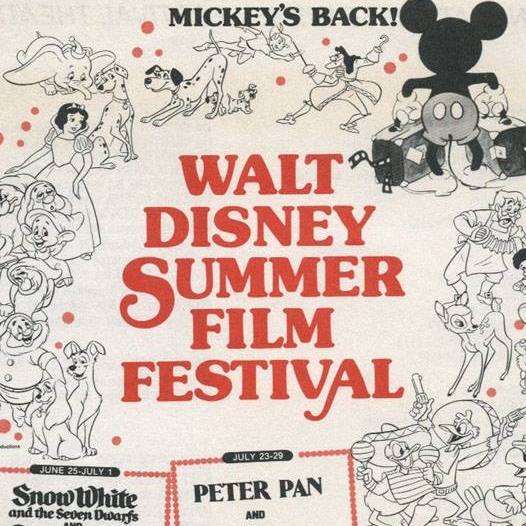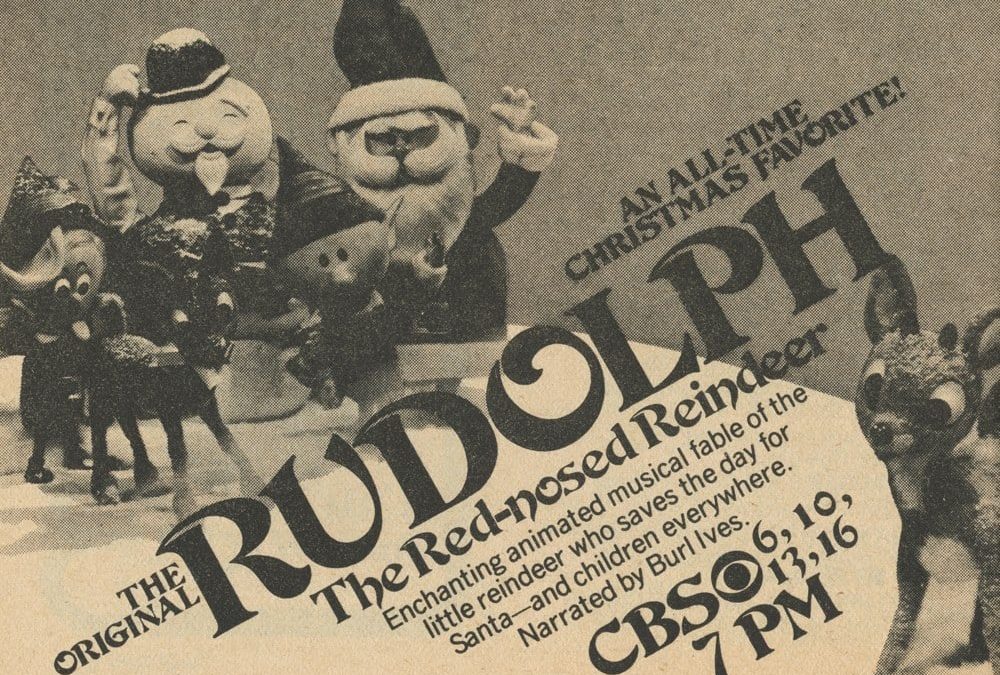A song a day keeps the coronavirus blues away:
“He went down in history!”
56 years ago on 12/6/64 the most popular, and the greatest, Christmas animated special appeared on NBC’s General Electric Fantasy Hour. It used songs that existed of Johnny Marks and some he wrote for the special. It was the first big special for Arthur Rankin Jr. and Jules Bass, Rankin/Bass, having done two animated series up to that point, “The New Adventures Of Pinocchio” in stop motion and “Tales Of The Wizard Of Oz” in cel animation, it having a sequel in 1964 called “Return To Oz” that aired on the GE Fantasy Hour of NBC.
After the huge success of the first airing of “Rudolph” the sponsor, GE, asked for some changes, since audiences complained that Santa didn’t rescue the misfit toys. An additional song, which ended up being “Fame And Fortune”, replaced a second version of “Misfits”, and the misfit toys were rescued at the end.
This all required some edits: “We Are Santa’s Elves” was cut in half, the reprise of “Misfits” was now the “new” “Fame And Fortune” song, after Santa takes off at the end, dialogue with the family is removed, as well as Yukon discovering a peppermint mine (with gorgeous animation), and the original end credits were removed, with the action of Santa delivering toys with the elves taking center stage, and the packages having the credits removed.
I’ve always felt the second version is the superior version. The special was fine-tuned, and the impact is more powerful. I’d prefer all the footage to be included, or at least the ones that don’t overlap, but I prefer “Fame And Fortune” and the “new” end credits over the earlier version. Having made a few short films, I know how one can improve a production when one gets objective as to what works best for the production’s success, and I think this is almost a poster example of artistry being honed to perfection. Technically, the peppermint mine scene is gorgeous, but I DON’T think it’s a good joke, and it is technically in the way, so late in the story. When your story is wrapping up, slowing down the payoff can get in the way, and I do think that when Santa takes off we should be going to the sky, not remaining on the ground, even if briefly.
In the original version just before Sam The Snowman says “Well folks, as for the rest of the story”, the music comes to a stop, and a few moments later the “Rudolph” finale begins. In the 1965 version Maury Laws made a seamless, joyous transition to the finale, and it is one of the most magical moments in entertainment history. Even Santa’s “Merry Christmas” was improved upon in 1965, with a new more powerful exclamation by Stan Francis (the voice of Santa), putting the final exclamation on the second version.
The 1965 version has not been remastered yet. The 1964 version has been the only version shown or presented since 1998. It does have more footage, which makes it logical. Technically the “1964” version isn’t technically the 1964 version, since they present the 1965 ending, with the rescue of the toys, and the 1965 end titles. It is a hybrid, but it would be nice if BOTH were properly presented in a special edition at some point.
Either way, “Rudolph” is one of the greatest achievements of television and animation history, with great performances by Burl Ives, Billie Mae Richards (Rudolph), Paul Soles (Hermey; Soles would later do the voice of Spiderman and Peter Parker in the 1967 classic animated version of “Spiderman”), Larry D. Mann (Yukon), Stan Francis (Santa), Paul Kligman (as Donner, Clairice’s father, and the coach; Kligman would do the voice of J. Jonah Jameson in the 1967 “Spiderman”), Janice Orenstein (Clairice), Alfie Scoop (Charlie In The Box and Fireball, +), Corrine Conley (the misfit doll), Carl Banas (as the head elf and the Spotted Elephant; later he’d become the voice of “Rocket Robin Hood”), and Peg Dixon (Mrs. Donner, and Mrs. Claus, +, who also voiced Betty Brant in “Spiderman”).
The use of songs to progress the story is masterful, and perfectly weaved by Maury Laws from Johnny Marks’ classic songs, some written specifically for this special. Most of all the story has great heart, and characters you care about (Clarice still caring for Rudolph, Rudolph’s sacrifice when he takes off alone to not endanger his friends, Yukon defeating Abominable, Abominable being reformed, Santa seeing the worth of all and not just the ones that are obvious). Yes, Santa is a bit harsh, but as Arthur Rankin stated “He was a business man” (OK, Santa could have been nicer, but would be in subsequent Rankin/Bass specials), and either way it’s SANTA!!!! He does mellow out as the special progresses.
Burl Ives is the perfect host and narrator through this magical world, and it is this special that has immortalized the artistry of Burl. “Silver And Gold” is given so much more meaning by the beauty that Burl infuses it with. Burl’s version of “Holly Jolly Christmas” in the special is THE version (the record version he later did isn’t quite up to the special’s special rendition). Burl’s version of “Rudolph the Red-Nosed Reindeer” at the climax is one of the two perfect versions of the song (a version from Peter Pan Records is the other), one of the most joyous realizations of a song ever done.
There’s a reason it’s the longest running special in television history. It started on NBC till 1971, and went over to CBS on 12/8/72 where it has stayed for 48 years now. In 2019 it also started airing on Freeform, and between the CBS and Freeform broadcasts the show is given quite often during the holidays.
If I had to pick only ONE holiday special, it is “Rudolph”. Though there are really like 10 or 11 I would put up there, “Rudolph” I think is the one that leads the sleigh.
“Well folks, as for the rest of the story… He went down in history.”

